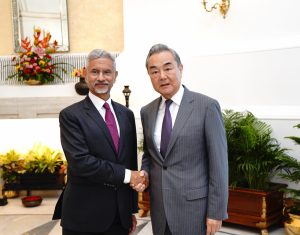Chinese Foreign Minister Wang Yi’s recent visit to New Delhi — his first in three years — is being hailed as a “breakthrough” that “could potentially reset” the trajectory of bilateral relations. Indeed, the outcomes of the diplomatic talks are quite impressive, especially the decision to resume trade at three border outposts and strengthen multilateral coordination in the BRICS and Shanghai Cooperation Organization (SCO) forums.
The meeting was a culmination of a series of steps toward the steady normalization of ties, which began in October 2024, when the two countries reached an agreement on patrolling arrangements along the disputed Line of Actual Control. This has followed incremental improvement in Sino-Indian ties, most notably in the economic domain, with Beijing lifting curbs on fertilizers, rare earths, and tunnel boring machines exports to India. According to some Indian media outlets, New Delhi is also currently considering proposals to ease existing restrictions on Chinese investments in non-sensitive sectors. Prime Minister Narendra Modi’s upcoming visit to China — his first in seven years — for the Shanghai Cooperation Organization (SCO) summit in Tianjin is expected to carry the positive momentum in ties further.
It is clear that against the backdrop of global trade wars driven by U.S. President Donald Trump’s tariffs, which have reinforced Washington’s unreliability as a trustworthy partner, India and China are carefully projecting an image of amity and cooperation. As compelling as these narratives may be, the continued depth of mutual suspicion came to the fore over the divergence on the language surrounding the Taiwan question.
Following Wang’s meeting with India’s Minister for External Affairs S. Jaishankar at New Delhi, the readout from the Chinese side in Mandarin stated that the Indian foreign minister said that “Taiwan is a part of China.” However, Jaishankar’s opening remarks, as published on India’s Ministry of External Affairs (MEA) website made no mention of Taiwan.
Meanwhile, the MEA’s statement following the meeting mentioned that the “Chinese side raised the issue of Taiwan” and that the “Indian side underlined that there was no change in its position on this issue.” Commenting on this “clarification” issued by the MEA, Chinese Foreign Ministry spokesperson Mao Ning said that it came as a “surprise” to Beijing and that it was “inconsistent with the facts.”
It is worth noting that despite Beijing’s repeated calls for India to reaffirm its adherence to One China policy, New Delhi has refrained from using the phrase since 2008. Nevertheless, New Delhi has been adhering to the policy, which is why India and Taiwan do not have formal diplomatic and consular missions in their respective countries. Neither has New Delhi indicated in any way that it is looking for more formal engagement with Taipei. In fact, India has been cautious in its engagement with Taiwan and deferential to Chinese policy sensitivities. Thus far, New Delhi’s ambiguous position has ensured that the Taiwan question has not derailed China-India relations.
As noted by Indian strategic affairs analyst C. Raja Mohan, India’s refusal to reaffirm the One China policy reflects its uneven recognition of sovereignty and territorial integrity between New Delhi and Beijing, as the Chinese have not expressed support for India’s sovereignty over Jammu and Kashmir. Therefore, Beijing’s motivations in including its language around Taiwan in a quote attributed to Jaishankar reflect a lack of sensitivity toward India’s position, which only serves to aggravate mutual suspicions that continue to mar bilateral ties.
As it stands, conflating the positive momentum in ties with strategic embrace is a gross misreading of the current Sino-Indian bilateral relationship.
In light of China’s renewed diplomatic offensive to isolate Taiwan internationally, Beijing can be expected to push New Delhi further to align domestic positions with Beijing’s official formulation of the One China principle. While previously New Delhi might have gotten away with using vague language about One China to pursue mutually beneficial relations in other sectors, in light of Beijing increasingly pursuing claims over Taiwan, this issue is poised to become a thorny issue, which could derail lasting rapprochement.

































